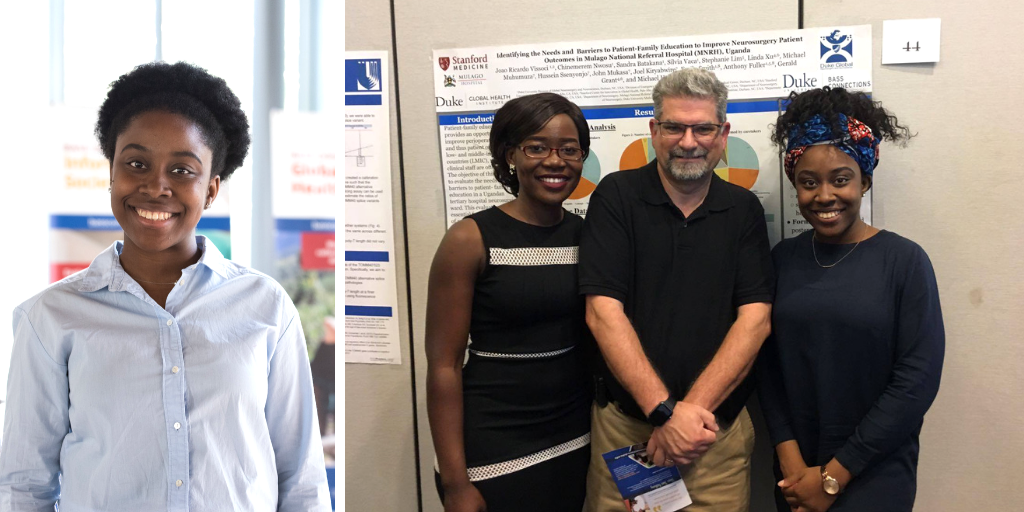Student Develops Health Literacy Tools to Empower Patient Caregivers
December 4, 2018

What happens when family members and friends are charged with administering postoperative patient care to their loved ones? And how does this care affect patient outcomes?
Duke senior Chinemerem Nwosu has been studying these questions for almost four years as a member of the Interventions Improving Neurosurgery Patient Outcomes in Uganda team. Born and raised in Lagos, Nigeria, Nwosu is passionate about improving health systems in Sub-Saharan Africa and credits her upbringing with forcing her to think critically about determinants of health and their relationship to quality of life.
Last spring, Nwosu received a Bass Connections Follow-on Student Research Award to evaluate the impact of family caregiver health literacy on patient outcomes in the neurosurgery ward at Mulago National Referral Hospital in Kampala, Uganda. Her project is mentored by Michael Haglund. Recently, she shared this update:
Cost-efficient and Culturally Appropriate Ways to Address Health Education Needs in Uganda
By Chinemerem Nwosu ’19
 In many hospitals in low-income African countries such as Uganda, family members are caregivers that take on patient care roles such as feeding and administering oral medication. This “informal” care is necessary in the healthcare continuum due to severe physician and nurse shortages. They carry out these responsibilities with little to no health knowledge or without the navigation skills necessary to access health information and services. This has had detrimental effects on patient outcomes.
In many hospitals in low-income African countries such as Uganda, family members are caregivers that take on patient care roles such as feeding and administering oral medication. This “informal” care is necessary in the healthcare continuum due to severe physician and nurse shortages. They carry out these responsibilities with little to no health knowledge or without the navigation skills necessary to access health information and services. This has had detrimental effects on patient outcomes.
During my time conducting research at Mulago Hospital (MNRH) in Uganda as part of the patient-caretaker education team, we identified the barriers that patients and their caregivers face when accessing health information. With few medical personnel to educate them and limited resources available, we went on to design various educational interventions to address these barriers. Despite this, patient outcomes were not improving and mistakes that family caregivers unintentionally made often led to preventable deaths. I was pushed to think more broadly and critically about solutions to health education problems in this setting and found that addressing health literacy needs of family caregivers is at the foundation of improving the health outcomes.
Measuring health literacy of caregivers is severely understudied in literature. Consequently, it was difficult for me to find an appropriate health literacy assessment tool that is not only culturally appropriate but can also be used in the context of a neurosurgical ward. I decided to modify and use the Short Assessment of Health Literacy (SAHL), originally developed in Spanish and English as well as for patient populations in developed countries, because of its conciseness and adaptability.

I worked to validate and translate the SAHL tool to fit my target population and research goals. This process involved working with medical personnel both in the U.S. and Uganda to ensure appropriate cross-cultural validation of the research instrument. This translation entailed rigorous methodological approaches in order to maintain the true meaning of the words and provide a reliable measure of health literacy in Luganda, one of the major languages in Uganda.
My next steps will be to use this modified SAHL tool to measure the health literacy levels of family caregivers, assess the impacts on patient outcomes and redesign educational interventions that will meet their specific health education needs. My long-term goals are to bring attention to an understudied area of clinical research and empower these caregivers by equipping them with resources tailored to their health literacy needs. This will help patient caregivers make the best decisions for those individuals in their care.
Learn More
- Explore this 2017-18 project team, and learn what the team is doing this year.
- Read Nwosu’s reflection from the GLOCAL 2018 Global Health Conference in Houston, and check out other stories from students about their Bass Connections experience.
- Meet all of the 2018 Follow-on Student Research Award grantees.
Images: Top: Nwosu and teammates at MNRH in Uganda in the summer of 2017; Nwosu in Uganda (Courtesy of the Interventions Improving Neurosurgery Patient Outcomes in Uganda team); Middle: Nurse and caregiver at MNRH in the summer of 2018 (By Chinemerem Nwosu); Bottom: Nwosu at the Bass Connections Showcase in April 2018; Sandra Batakana, Michael Haglund and Nwosu at the Bass Connections Showcase in April 2017
